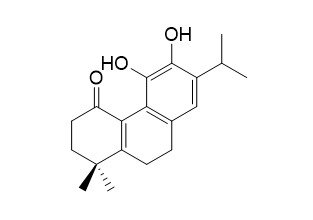Sageone
Sageone represents a promising anticancer agent against gastric cancer that warrants further study, it synergizes with cisplatin cytotoxicity in SNU-1 human gastric cancer cells.Sageone also shows antiviral activity.
Inquire / Order:
manager@chemfaces.com
Technical Inquiries:
service@chemfaces.com
Tel:
+86-27-84237783
Fax:
+86-27-84254680
Address:
1 Building, No. 83, CheCheng Rd., Wuhan Economic and Technological Development Zone, Wuhan, Hubei 430056, PRC
Providing storage is as stated on the product vial and the vial is kept tightly sealed, the product can be stored for up to
24 months(2-8C).
Wherever possible, you should prepare and use solutions on the same day. However, if you need to make up stock solutions in advance, we recommend that you store the solution as aliquots in tightly sealed vials at -20C. Generally, these will be useable for up to two weeks. Before use, and prior to opening the vial we recommend that you allow your product to equilibrate to room temperature for at least 1 hour.
Need more advice on solubility, usage and handling? Please email to: service@chemfaces.com
The packaging of the product may have turned upside down during transportation, resulting in the natural compounds adhering to the neck or cap of the vial. take the vial out of its packaging and gently shake to let the compounds fall to the bottom of the vial. for liquid products, centrifuge at 200-500 RPM to gather the liquid at the bottom of the vial. try to avoid loss or contamination during handling.
Arch Biochem Biophys.2020, 687:108363.
South African Journal of Botany2024, 168:209-220.
BMC Complement Altern Med.2019, 19(1):367
Int J Mol Sci.2023, 24(18):14077.
Biomed Pharmacother.2021, 139:111585.
VNU Journal of Science2023, No. 20.
Korean J. Medicinal Crop Sci.2022, 30(2):117-123.
Inflammation2015, 38(1):445-55
Mol Microbiol.2019, 112(1):317-332
Molecules.2020, 25(7):1625.
Related and Featured Products
11-Hydroxy-12-methoxyabietatriene
Catalog No: CFN92286
CAS No: 16755-54-7
Price: Inquiry(manager@chemfaces.com)
11-Hydroxy-sugiol
Catalog No: CFN90366
CAS No: 88664-08-8
Price: $490/5mg
Salvinolone
Catalog No: CFN92243
CAS No: 120278-22-0
Price: Inquiry(manager@chemfaces.com)
14-Deoxycoleon U
Catalog No: CFN97924
CAS No: 88664-09-9
Price: Inquiry(manager@chemfaces.com)
6,11,12,16-Tetrahydroxy-5,8,11,13-abitetetraen-7-one
Catalog No: CFN88024
CAS No: 1295650-67-7
Price: $318/5mg
20-Deoxocarnosol
Catalog No: CFN92175
CAS No: 94529-97-2
Price: $413/5mg
2,11,12-Trihydroxy-7,20-epoxy-8,11,13-abietatriene
Catalog No: CFN95428
CAS No: 1608462-12-9
Price: $318/10mg
6-Epidemethylesquirolin D
Catalog No: CFN99695
CAS No: 165074-00-0
Price: Inquiry(manager@chemfaces.com)
Carnosol
Catalog No: CFN99956
CAS No: 5957-80-2
Price: $80/20mg
Isorosmanol
Catalog No: CFN93009
CAS No: 93780-80-4
Price: Inquiry(manager@chemfaces.com)
Phytomedicine: international journal of phytotherapy and phytopharmacology, 2016, 23(13):1671-1679.
Sageone, a diterpene from Rosmarinus officinalis, synergizes with cisplatin cytotoxicity in SNU-1 human gastric cancer cells.[Reference:
WebLink]
Chemotherapy resistance is a major obstacle for the effective treatment of cancers. Although several studies have described the anticancer properties of rosemary extract and its components, the detailed mechanisms of action are poorly understood.
METHODS AND RESULTS:
Activity-guided fractionation and repeated chromatographic separation of the n-hexane fraction of the aqueous methanol extract over silica gel, RP C18, and Sephadex LH-20 led to the isolation of three compounds. The structures of the compounds were determined using 1H, 13C, and two-dimensional nuclear magnetic resonance spectroscopy, mass spectroscopy, and infrared spectroscopy. The 3-(4,5-dimethylthiazol-2-yl)-2,5-diphenyl tetrazolium bromide assay was used to evaluate the cytotoxicity of these compounds. Cell cycle, apoptotic cell populations, and mitochondrial membrane potential were analyzed by flow cytometry. Western blot analysis was conducted to detect apoptosis-related proteins.An abietane diterpenoid, Sageone (1), an icetexane diterpenoid, (-)-barbatusol (2), and a monoterpene, (+)-verbenone (3), were identified. Of these compounds, Sageone (1) showed cytotoxicity against SNU-1 cells with an IC50 of 9.45 ± 1.33 µM. Sageone reduced the expression of Akt dramatically, as opposed to cisplatin, which increased phosphorylated Akt. Sageone combined with a subtoxic dose of cisplatin had synergistic effects on apoptosis induction in SNU-1 cells, as confirmed by calculating the combination index. Co-treatment was significantly more effective than monotherapy at reducing cell viability and inducing apoptosis, as determined by analyzing DNA fragmentation. The combined treatment of Sageone and cisplatin markedly reduced Akt expression and phosphorylation, accompanied by increases in cleaved caspase-3, -9 and PARP.This is the first time compounds 1 and 2 have been isolated from R. officinalis. Sageone induced apoptosis in SNU-1 human gastric cancer cells and notably enhanced the cytotoxicity of cisplatin in SNU-1 cells, which are known to be resistant to cisplatin.
CONCLUSIONS:
These findings suggest that Sageone represents a promising anticancer agent against gastric cancer that warrants further study.
Phytochemistry, 1994, 35(2):539-541.
Antiviral diterpenes from Salvia officinalis.[Reference:
WebLink]
METHODS AND RESULTS:
Two new diterpenoids, safficinolide and
Sageone, which showed antiviral activity, were isolated from the aerial parts of Salvia officinalis. Their structures were established by a detailed spectroscopic analysis.



